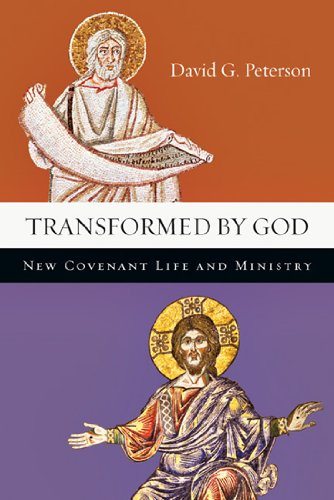Have you ever encountered a passage of Scripture that leapt off the page the first time you read it? And, after the initial leaping effect quieted down a little, wondered, Does this passage actually tie in to the rest of the Bible, or is it just a bolt out of blue sky?
On first read Jeremiah 31:31–34, in which God promises to make a new covenant with his people, seems to be a massively important passage. But does it meaningfully connect with the rest of Scripture? And what difference does it make for Christian life and ministry?
David Peterson’s new book, Transformed by God: New Covenant Life and Ministry, answers “Yes!” and, “All the difference.” And in about 180 concise, closely argued pages, Peterson shows us how and why.
Careful Exposition of Jeremiah’s New Covenant in the New Testament
Peterson, senior research fellow and lecturer in New Testament at Moore Theological College in Sydney, begins the book by expounding Jeremiah’s new covenant promise in the context of the whole book of Jeremiah. He then compares the promise with conceptually parallel Old Testament passages such as Hosea 2:14–23, Isaiah 54:4–14, and Ezekiel 11:17–20 and 36:26–28 (Ch. 1). In the rest of the book he traces out this passage’s decisive impact on the New Testament writings. First, he considers the echoes of new covenant themes in Luke’s portrayal of the renewal of Israel and the nations in Luke and Acts (Ch. 2). He then expounds the role the passage plays in the argument of Hebrews (Ch. 3), rightly noting, “Jeremiah’s prophecy of a new covenant features more prominently in Hebrews than in any other New Testament document” (77).
In chapter 4, Peterson briefly mentions Paul’s new covenant allusion in 1 Corinthians 11:25, and then engages in-depth with how the new covenant informed Paul’s presentation of his ministry in 2 Corinthians 2:14–7:4, which is the only other context in which Paul explicitly refers to the new covenant (105). After thus dealing with Paul’s explicit references to the new covenant, Peterson explores more subtle allusions to the passage and other related Old Testament promises throughout Romans (Ch. 5). The book’s final chapter explores the new covenant’s effect on John’s letters and Gospel, seen most vividly in 1 John 2:20 and 2:27 (Ch. 6).
Centrality of the New Covenant
Throughout the book, Peterson reads biblical texts closely without drowning the reader in technical detail. I found Peterson’s reading of Jeremiah 31:31–34 in the context of Jeremiah as a whole to be particularly illuminating, along with his capable treatment of the new covenant in Hebrews. (See especially his brief summary of the flow of Hebrews 7–10 on page 83.) The book is moderately academic—there’s occasional discussion of Greek terms, for example—but most engaged, open-Bible readers should be able to make their way through it.
The cumulative effect of this much careful biblical work is that Peterson amply proves his main thesis: “New Covenant theology is central to New Testament thinking about the saving work of Christ and the way it is appropriated by believers” (15). If the new covenant promise seems to leap off the page on first reading, Peterson demonstrates that it does so precisely because it is foundational to how the New Testament understands what Jesus came to do, how we now relate to God, and how the gospel makes us into new people.
How the New Covenant Transforms Christian Life and Ministry
Consistent with the goal of the new covenant promise itself, Peterson carefully demonstrates how these exegetical conclusions lead to transformed life and ministry within the church. His application sections are brief but pastorally on point and provide rich food for reflection. For example:

Transformed by God: New Covenant Life and Ministry
David G. Peterson
What significance does the New Covenant have for life and ministry? Foundational to the New Testament understanding of Jesus is Jeremiah’s promise of a “new covenant”—that God will transform our hearts. In this important new study, David Peterson expounds Jeremiah’s oracle and its influence on the New Testament, as well as the relevance of the New Covenant for life today. Peterson demonstrates the practical implications of this new identity, especially for evangelism and the care of believers. As part of this renewed community, Christ-followers are empowered to point others to God’s glory in everything. In Transformed by God, readers will find the biblical basis for New Covenant ministry and the power it provides.
Acts shows that evangelism and the nurture of believers are divine activities, accomplished through human agents, to achieve God’s covenant plan for the blessing of the nations. Those who engage in these ministries today can share the confidence of the apostles in God’s enabling (75).
And Peterson memorably summarizes a chapter’s worth of careful work on how the new covenant transforms believers when he writes:
Under the New Covenant, the motivation for change is the grace of God in the saving work of Jesus the Messiah, the Son of God. The pattern for change is the character, the life and the teaching of Jesus. The empowerment for change is the gift of the Holy Spirit. With this Trinitarian focus, New Covenant ministry offers something radically new, enabling a transformation of believers collectively “from one degree of glory to another” (128).
Nourishing and Enlivening
Thus, Transformed by God synthesizes a number of Old Testament prophesies that tie in to the new covenant, shows how these themes play out throughout much of the New Testament, and applies this careful biblical work to Christian life and ministry.
This is an excellent book, and I have no substantial critiques. Transformed by God is just the kind of book that pastors should regularly consume. And just about any Christian who is eager to learn the Bible better, especially how to put the whole thing together, should find it nourishing and life-giving.



































